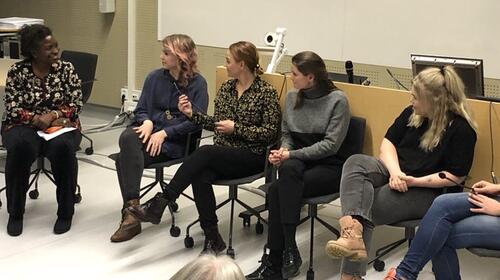Updates
With Sweden, strengthening midwifery care worldwide
16 Dec 2019UNFPA Executive Director Dr. Natalia Kanem traveled to Stockholm to meet with Swedish officials to build upon the commitments made at the recent Nairobi Summit on ICPD25 and bolster UNFPA’s longstanding partnership with Sweden in supporting quality midwifery care worldwide.
From 10-12 December, Dr. Kanem met with Swedish International Development Cooperation Agency (Sida) Director-General Carin Jämtin, Minister for Foreign Affairs Ann Linde, Ambassador-at-Large for Combating Human Trafficking Per-Anders Sunesson, other officials from Sida and the Ministry of Foreign Affairs, members of Parliament and key civil society partners including the Karolinske Institute and Plan International Sweden.
With 2020 designated by the World Health Assembly as the International Year of the Nurse and the Midwife, midwifery was a strong focus of the discussions. Dr. Kanem highlighted the coming year as an important opportunity for Sweden to continue its engagement with UNFPA on midwifery, in collaboration with the International Confederation of Midwives (ICM), the World Health Organization (WHO) and other key partners.
Throughout the year, UNFPA will work to build momentum to enhance investments in the midwifery workforce, shed a spotlight on midwives and the challenges they face, and make the case for quality midwifery care as not only the backbone of universal and primary health care, but also the key to ensuring access to the entire package of sexual, reproductive, maternal, newborn and adolescent health (SRMNAH).
Sweden’s support, Dr. Kanem emphasized, is key to this work. For 15 years, Sweden has been a linchpin of UNFPA’s efforts to promote and strengthen midwifery around the world. UNFPA has drawn inspiration from Sweden’s 300 year old model of midwifery care as a way to sharply reduce maternal and newborn mortality and secure access to sexual and reproductive health and rights, including in humanitarian crises.
With Sweden’s support, UNFPA has scaled up its work on midwifery in over 120 countries, supporting education and training of some 150,000 midwives, while also building the governance and leadership capacities of hundreds of midwifery organizations in raising the profession’s profile, engaging in policy dialogues and improving the quality of care. Meanwhile, UNFPA-trained midwives are playing heroic roles in countries facing humanitarian crises, including Bangladesh, the Democratic Republic of the Congo, Haiti, South Sudan and Yemen.
To further strengthen this work, UNFPA has a new a global Midwifery Strategy (2018-2030), launched in Namibia earlier this year, that aims to enable countries to develop an adequate, competent, well supported and equitably deployed midwifery workforce. Fully aligned with the SDGs and with the UN Secretary-General’s Every Woman Every Child Strategy, the new strategy has six pillars: education, association, regulation, enabling environment, workforce policies, and making midwifery a central pillar of SRMNAH.
With midwifery central to UNFPA’s programming to promote maternal health and end preventable maternal deaths, Dr. Kanem also expressed her appreciation for Sweden’s longstanding support of UNFPA’s Maternal and Newborn Health Thematic Fund (MHTF), UNFPA’s flagship programme for improving maternal and newborn health and well-being. Working in 39 countries with some of the world’s highest rates of maternal mortality and morbidity, the MHTF delivers strategic interventions to improve maternal and newborn health, including training thousands of midwives each year.
In light of the overall global funding decrease for maternal health, Sweden’s generous and predictable funding for the MHTF has a critical impact on this fund, enabling its catalytic role in strengthening programmes and securing further resources to support countries in their efforts to provide quality care and reduce maternal and newborn mortality.
